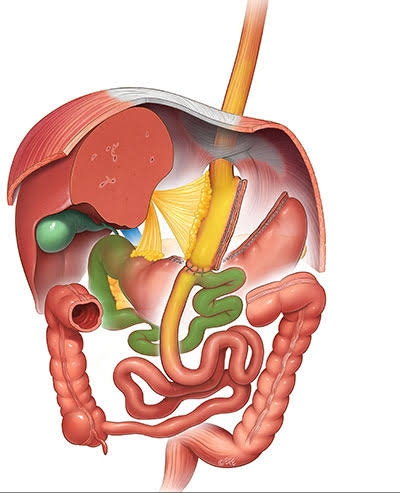Lapsurgery.com.au, Gastric Bypass Process – Gastric bypass surgery, also known as Roux-en-Y gastric bypass, is a surgical procedure designed to help individuals with severe obesity achieve significant weight loss. This procedure involves creating a smaller stomach pouch and rerouting the digestive system to bypass a portion of the small intestine.
Gastric Bypass Involves

The first step of gastric bypass involves dividing the stomach into two sections: a smaller upper pouch and a larger lower pouch. This restricts the amount of food that can be consumed, leading to a feeling of fullness with smaller meals. The smaller stomach pouch is then connected directly to the small intestine, bypassing the rest of the stomach and the upper portion of the small intestine.
Mechanism Gastric Bypass
One of the key mechanism behind gastric bypass’s effectiveness is the reduction in the absorption of nutrients. By bypassing a portion of the small intestine, the body absorbs fewer calories and nutrients from the ingested food. This results in weight loss as the body starts utilizing stored fat for energy.
Gastric bypass surgery is considered a major operation and is typically recommended for individuals with a body mass index (BMI) of 40 or higher, or a BMI of 35 or higher with obesity-related health issues. Before undergoing the procedure, patients often undergo a thorough evaluation to assess their overall health and suitability for surgery.
While gastric bypass can be an effective tool for weight loss, it’s crucial to understand that it is not a standalone solution. Lifestyle changes, including a healthy diet and regular exercise, are essential for long-term success. Additionally, patients need to commit to ongoing medical monitoring and follow-up appointments to address any potential complications or nutritional deficiencies.
As with any surgery, gastric bypass carries risks and potential side effects, including infection, blood clots, and nutritional deficiencies. Therefore, it’s important for individuals considering this procedure to have a thorough discussion with their healthcare team to weigh the potential benefits against the risks and make an informed decision based on their individual health needs.
Closing
In conclusion, gastric bypass surgery is a significant intervention for individuals struggling with severe obesity. While it can lead to substantial weight loss and improvement in obesity-related conditions, it should be approached with careful consideration, and patients must be committed to adopting a healthy lifestyle post-surgery for sustained success.

